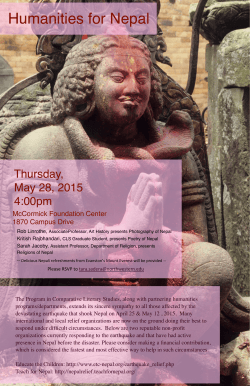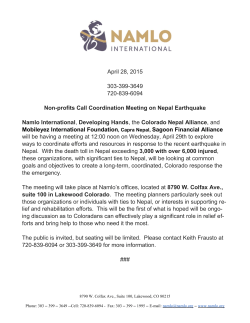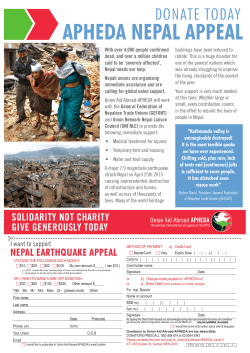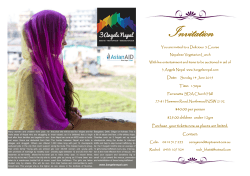
Concept Note and Terms of Reference: Nepali Gender Expert
Concept Note and Terms of Reference: Nepali Gender Expert Psychosocial Support for Victims of Gender-Based Violence in Transitional Justice Settings: Learning from the Nepal Case Project Objective and Expected Outcomes The International Center for Transitional Justice’s (ICTJ) research and work in Nepal have exposed a critical need for psychosocial support among victims of conflict-related sexual violence (CRSV) in the country. Unfortunately, ICTJ has also encountered a dearth of information about if and where support structures exist, how to access them and what kind of care they are providing to victims. Finally, ICTJ has found in its own work that these context-specific needs are in many ways exacerbated by a more general knowledge gap within the field of transitional justice about how to effectively link transitional justice processes with knowledge, lessons and best practices in international disaster psychology and related fields. With this project, ICTJ hopes to begin to address each of these issues to facilitate the delivery of high quality assistance to the drafting and implementation of policies seeking to provide psychosocial support victims of conflict-related sexual and gender-based violence (SGBV). To do so, ICTJ will produce two reports. The first will be a brief, stand-alone literature review and analysis of current best practices from the field of international disaster psychology on the provision of psychosocial support to SGBV victims specifically as these relate to post-conflict situations. The second will be an assessment report specific to Nepal about psychosocial support services for victims of CRSV in the country. Both reports will emphasize the need for psychosocial support programs that are both gender-sensitive and informed by cultural realities. Initial research and work on the first report will inform subsequent field research, analysis and recommendations for the Nepal context, in addition to serving as a valuable resource for transitional justice stakeholders in any context. The latter piece will cater specifically to Nepal by helping identify what forms of existing and potential support would be most effective in the country. ICTJ will use the findings and recommendations from the field research to engage with Nepali stakeholders involved in transitional justice measures in Nepal, including the Nepali Ministry of Peace and Reconstruction’s (MoPR) psychosocial support program, the country’s Truth and Reconciliation Commission and any future reparations plans and programs. We will also seek to engage with relevant development actors with the findings. The expected outcomes of this work are: 1. A stand-alone document is produced (maximum 25 pages) that reviews and analyzes existing literature on experiences in the provision of psychosocial support to victims of SGBV in transitional justice settings. This analytical literature review will consolidate important and authoritative resources from the subsection of the field of international disaster psychology focusing on women and conflict. The document will also identify principal challenges encountered when designing and implementing psychosocial support programs for victims of SGBV, as well as successful strategies, methodologies or approaches used in past contexts. An outline and rough draft of this document will be completed prior to field research in Nepal so that it may inform the country-specific research project. However, the document will be strengthened, edited and completed after the completion of the Nepal report International Center for Transitional Justice | 5 Hanover Square, 24th Floor, New York, NY 10004 | T +1 (917) 637-3800 | F +1 (917) 637-3900 www.ictj.org 2. Field research is undertaken in Nepal to: a. Conduct a needs analysis with actors working directly with CRSV victims b. Assess currently available forms of care, appropriateness, cultural barriers, outreach strategies and existing methodologies for support provision used by women’s groups and other relevant actors 3. A 30-35 page report is produced that includes: a. A condensed summary of the key lessons, best practices and conclusions contained in the generalized research paper identified in Outcome 1 b. An assessment of the nature and effectiveness of identified support structures or programs, particularly in terms of how they are meeting women’s needs and/or what is lacking c. A set of recommendations offers targeted guidance on how government-led transitional justice measures and other national or international development initiatives can most effectively fill existing gaps and address women’s psychosocial needs in Nepal, due to CRSV, in culturally and gender-sensitive ways Methodology and Key Research Questions Desk Research for Analytical Literature Review Desk research will be undertaken to inform the drafting of the general research product assessing key sources, best practices and sound methodologies for designing psychosocial support programs and policies. This document will also include guiding questions to be asked in any new context, as well as key recommendations for transitional justice stakeholders or other development actors involved in the design and implementation of psychosocial support programs for conflict-related victims of sexual violence, with a focus on integrated approaches that combine long-term, targeted psychosocial care, livelihood programs, educational opportunities for victims and their families and other forms of economic support. Modes of research: Desk research If deemed necessary to complement desk research, interviews with key practitioners or other sources with authoritative knowledge about the provision of psychosocial care to women victims of conflict-related sexual violence. Field Research Field research will entail a series of semi-structured interviews and focus group meetings/consultations in four different areas of Nepal. The research will be structured around three components: needs assessment; quality assessment and an assessment of informal and/or local support structures. Each component should be conducted in such a way that expands our understanding of psychosocial support far beyond a traditional medical model focused singularly on Western-based practices such as various psychotherapy models. Research should focus heavily on both the psychological and social components of trauma and healing associated with conflict-related sexual violence. International Center for Transitional Justice | 5 Hanover Square, 24th Floor, New York, NY 10004 | T +1 (917) 637-3800 | F +1 (917) 637-3900 www.ictj.org 1. Needs assessment: What are the most pressing needs of women victims of CRSV in Nepal in terms of receiving psychosocial care? How do women in Nepal define or frame these needs? What language is used to discuss trauma that is likely psychological in nature? What do individual women victims need/want most from potential support structures? What is needed at a collective level, especially in communities that have been most impacted? How could transitional justice measures address both sets of needs most effectively? Modes of research: Interviews with NGOs that have worked with sexual and gender-based victims Desk research, contact with donors1 2. Quality assessment: Where we know psychosocial support services are available, what is the quality of care and training? Are these providers meeting women’s needs? Are certain types of care providers more effective than others (i.e. traditional medical providers versus community support programs; governmentrun versus civil-society led etc.)? What additional modes of support are lacking? Do services tend to be standalone rather than integrated? How sensitive and culturally sound are existing services and related outreach programs, given possibilities for stigma, marginalization and re-victimization for women victims? Modes of research: Desk research Meetings with government officials, women’s group representatives, international organization representatives in Nepal. International organizations can include groups working specifically on transitional justice measures, as well as development agencies such as UNDP and others Interviews with care providers, including government officials, medical personnel and NGO providers of psychosocial support Interviews with international donors who have funded work in this area with women victims of CRSV previously; use of donor reports and evidence if possible 3. Assessment of informal and/or local support structures: Where might women be seeking care outside of formal or dedicated psychosocial support structures? There is a high degree of stigma associated with mental illness and psychosocial support in Nepal, and research has shown that some women may manifest psychosomatic symptoms of psychological distress. Does this impact where women might be seeking care and support? Are support providers such as medical personnel, cultural or community centers and local healers aware of the possibility that they may be dealing with women victims of SGBV and are they well versed in detecting and handling such cases? 1 ICTJ hopes to be able to utilize pre-existing sources of information regarding the needs of conflict-related sexual violence victims in order to avoid re-traumatization, particularly in light of consistently unfulfilled promises of adequate transitional justice measures to address victims’ harms in the past. However, this relies on the existence and availability of sufficient secondary information. If this is not forthcoming, we will rethink this strategy and decide if the benefits of direct victim participation via interviews and focus group outweigh any potential negative repercussions. In this case, we would employ strict methodology in keeping with best practices around research with conflict-related sexual violence victims. International Center for Transitional Justice | 5 Hanover Square, 24th Floor, New York, NY 10004 | T +1 (917) 637-3800 | F +1 (917) 637-3900 www.ictj.org Similarly, there have been community-based initiatives and local women’s groups not initially recognized as providing psychosocial support in the past in places such as Peru, which has been characterized by socioeconomic marginalization similar to that of Nepal, that were actually providing some level of care for women victims. It would be beneficial to both identify any possible instances of similar such initiatives that already exist in Nepal and to assess their impact. Further research could explore if and how successful initiatives could be expanded and replicated, including by government supported transitional justice measures such as reparations programs or through future development work in the country. Modes of research: Desk research Meetings with victims’ groups and other women’s group representatives and other relevant local and national actors Interviews with victims and/or victim and women’s group representatives; local healers; medical personnel; community organizations and other relevant local and national actors Focus groups discussions in communities where local-level initiatives might be present Scope of Work and Timeline of Activities ICTJ seeks to hire two consultants, one international psychosocial support expert and one national expert, to conduct an assessment of the quality and existence of a range of psychosocial support services currently providing some degree of support or care to women victims of CRSV in Nepal. The consultancy will be carried out with the support of ICTJ’s Gender Justice Program and Nepal office. Frequent communication with both ICTJ offices is expected and ICTJ will be involved in the conceptualization of the research methodology and drafting of the three written products. The consultancy will commence with the national consultant preparing for field research by selection regional distribution of field work; identifying research participants from a range of fields (civil society, government, international organizations operating in Nepal); producing strategic travel itineraries and agendas and setting up interviews, focus groups and other meetings with the identified key actors. In parallel to this process, the international consultant will begin initial home-based research to work on the generalized research product. The international consultant will also use this time to familiarize herself/himself with the Nepal context and to support the national consultant in selection of regions and other research methodologies and logistics. The international consultant will travel to Nepal two times. The first trip will last approximately three weeks (five days in each of three field locations plus approximately six days in Kathmandu). The consultant will travel to Nepal again near the end of the consultancy for up to two weeks to hold a validation workshop and finalize and present the final report. The pre-assessment desk research and subsequent drafting components of the consultancy will be home-based, including the research and drafting of the analytical literature review. The national consultant will partake in all domestic travel in Nepal for field research and will be home-based for the remaining components of the project. International Center for Transitional Justice | 5 Hanover Square, 24th Floor, New York, NY 10004 | T +1 (917) 637-3800 | F +1 (917) 637-3900 www.ictj.org As noted, the field assessment will be conducted in three different regions around the country in addition to the capital. Both the national and international consultant will work together to conduct semi-structured interviews with relevant NGOs, women victims’ groups, government authorities and other key identified actors. The national consultant will act as a translator where necessary. Participants will be identified through input by local partners, the national consultant and ICTJ, as well as through initial desk research. Participants will be drawn from strategically identified districts where women are known or believed to have been most impacted by sexual violence. To the extent possible, participants will also be selected in such a way that reflects Nepal’s sociocultural diversity. Following the field research component, the international consultant will take the lead in preparing a first draft of the Nepal-specific report that analyzes the research findings and makes a series of recommendations regarding effective, comprehensive and culturally relevant support options for victims of CRSV. Ideally, recommendations will focus on psychosocial support needs, but will also outline how an integrated support program for women victims of CRSV should be designed. The two consultants will be in close contact during the drafting period, and the national consultant will contribute substantially to the report. The consultants will also be in close communication with ICTJ’s Nepal and New York offices throughout the duration of the consultancy, particularly regarding the design of the research project, subsequent data analysis and preparation of the report. Once a strong draft of the report is completed and has been submitted to ICTJ for an initial round of feedback and incorporation, the international consultant will return to Nepal to meet with a select group of stakeholders for a validation meeting to present findings and recommendations and receive comments and input. The national consultant will also participate actively in the workshop. After the validation meeting, the consultants will again collaborate to incorporate relevant feedback. Upon completion of a final draft of the Nepal report, ICTJ will host a small roundtable launch event to present the results and facilitate dialogue with a small group of civil society and government actors. This will serve as an opportunity to further discuss the findings and develop strategies to advocate for the implementation of integrated and effective support programs that include adequate and appropriate psychosocial components. Ideally, the government of Nepal will take short-term action on the report´s recommendations in interim support measures in addition to incorporating them into any formal transitional justice programs that will be implemented in the country. The recommendations will also seek to inform other initiatives led by civil society organizations, UN agencies or other international organizations working to support victims of conflict-related sexual violence and torture, including through relevant development initiatives. The consultancy is expected to up to 6 months. It is expected to begin in May 2015. A tentative timeline is included below. A detailed timeline will be produced collaboratively with ICTJ prior to the commencement of the consultancy. Weeks 1-4: Preparation time and initial research. The national consultant will use this time to coordinate and make preparations for all field research to take place with the international consultant. If deemed useful and necessary, he or she may begin with initial interviews or meetings. The international expert International Center for Transitional Justice | 5 Hanover Square, 24th Floor, New York, NY 10004 | T +1 (917) 637-3800 | F +1 (917) 637-3900 www.ictj.org will be working on the initial drafting of a generalized research product on psychosocial support to victims of SGBV in conflict settings during this phase Weeks 5-8: Field research plus travel Weeks 9-16: Initial drafting of the report Weeks 17-20: Validation meeting, final drafting of Nepal report and presentation plus travel Activities/Deliverables Unless stated otherwise, all activities are to be carried out under the direction of an international consultant with expertise in psychosocial support issues for victims of conflict-related sexual violence who will also be working on this project. All deliverables will be completed with guidance, input and feedback from ICTJ. 1. 2. 3. 4. 5. 6. 7. 8. 9. 10. 11. Participate in design and coordination of a plan and timetable for development of research Support desk research to assess the current scope of knowledge available on this topic, familiarize the international psychosocial expert with the dynamics of the Nepal context, and identify the gaps in knowledge that the assessment will address Assist as needed with the production of a detailed outline and rough draft for generalized research paper on key literature, best practices and sound methodologies for designing psychosocial support programs and policies for victims of SGBV in transitional contexts. This document will also include guiding questions to be asked in each new context, as well as key recommendations for transitional justice stakeholders and other relevant actors such as major development or other international organizations Lead the selection of the three districts where field research will take place in addition to Kathmandu based on strategic decisions about the situation of victims and the prevalence of torture and conflictrelated SGBV and with the support of an international consultant Develop a list of participants for semi-structured interviews and focus group consultations with the support of an international consultant. This list will reflect Nepal’s sociocultural diversity through representation from participants of various ethnicities, castes and socioeconomic groups Support the design of research instruments (questions, discussion topics, etc.) and methodologies necessary for the individual interviews and focus group consultations Set up and coordinate all research activities by scheduling interviews, focus groups and other meetings; designing agendas and, if needed, undertaking preliminary research prior to the arrival of the international psychosocial support expert Conduct individual and focus group interviews with identified participants in Kathmandu and three additional regions In coordination with the international consultant, submit full notes from interviews to ICTJ Nepal and New York offices Support the drafting of a written analysis of the information obtained during the field work Assist in the production of a final draft of the report to be shared with ICTJ for editing and return prior to the validation workshop International Center for Transitional Justice | 5 Hanover Square, 24th Floor, New York, NY 10004 | T +1 (917) 637-3800 | F +1 (917) 637-3900 www.ictj.org 12. 13. 14. Conduct validation workshop/s with select group of participants Support incorporation of new recommendations for future research and other minor modifications into the report as needed based on the results of the validation workshop A final report on the Nepal context is delivered with complete bibliography (30-35 pages maximum) Required experience: Must be a Nepali National Advanced degree in social science Significant experience providing support to conflict victims. Experience working with sexual violence victims in particular preferred Strong command of written and spoken English Good communication skills Ability to work well with a team Experience coordinating and conducting research work, including using participatory techniques Strong capacity for analytical thinking Some understanding of transitional justice and basic knowledge of the field is highly preferred Qualified candidates should submit a CV and cover letter detailing relevant experience and expertise to Sophie Bowd at SHodgson@ictj.org by April 27, 2015. Background to the Nepal Context Approximately eight years ago, the Comprehensive Peace Agreement (CPA) in Nepal ended ten years of violent conflict between state forces and the group then known as the Communist Party of Nepal-Maoist (CPN(M)). Women were victims of a wide range of violations during this time, including displacement, disappearance, execution, torture and SGBV, but exact estimates of the number of women victims are hard to find. Even if available, numbers would fail to include the countless women who are likely to have never reported violations, particularly sexual and gender based violations, for a variety of reasons, including fear of shame, stigmatization, re-victimization or trauma.2 Many of these women, both those who have reported violations and likely those who have remained silent, have also experienced differential and often exacerbated effects in comparison with many male victims, even when subjected to the same violation.3 Despite this bleak picture and the large number of victims requiring justice and redress for harms suffered, the Nepali government has been painstakingly slow to respond with sound transitional justice policies. Since the end of the conflict in 2006, there have been 2 OHCHR, “Nepal Conflict Report” (2012), http://www.ohchr.org/Documents/Countries/NP/OHCHR_Nepal_Conflict_Report2012.pdf. See also Advocacy Forum and ICTJ, “Across the Lines: The Impact of Nepal’s Conflict Women” (2010), https://www.ictj.org/sites/default/files/ICTJ-Nepal-Across-Lines-2010-English.pdf. 3 Advocacy Forum and ICTJ, “Across the Lines: The Impact of Nepal’s Conflict Women” (2010), https://www.ictj.org/sites/default/files/ICTJ-Nepal-Across-Lines-2010-English.pdf; ICTJ, “Beyond Relief: Addressing the Rights and Needs of Nepal’s Wives of the Disappeared” (August 2013) and ICTJ, “To Walk Freely with a Wide Heart: A Study of the Needs and Aspirations for Reparative Justice of Victims of Conflict-Related Abuses in Nepal” (2014), pps. 2, 3, 16-18; 20-25. International Center for Transitional Justice | 5 Hanover Square, 24th Floor, New York, NY 10004 | T +1 (917) 637-3800 | F +1 (917) 637-3900 www.ictj.org countless calls for justice and accountability measures, including a Truth and Reconciliation Commission (TRC), a Commission on Investigation of Disappeared Persons (CoID), reparations programs and criminal justice measures designed to deflect impunity. These calls, however, remain largely unanswered, and the majority of these measures have been stuck in limbo for years. Delays have contributed to a significant deterioration in the condition of many victims, as time, rather than healing, allows unredressed harms to languish. The Interim Relief Program (IRP), which commenced in 2008, is one measure that has provided some degree of assistance to victims. While recognized for its relatively rapid rollout and usefulness as a short-term response, the IRP has been criticized on normative, substantive and procedural grounds.4 Moreover, the program is highly discriminatory against many women victims because of a definition of “conflict-affected persons” that categorically excludes victims of torture, rape and SGBV. The little support the IRP could potentially provide for these groups of victims—reimbursement of medical costs for those facing disability as a result of conflict violations, for example—is rendered effectively moot by exclusionary criteria and other stipulations. And while other benefits provided by the IRP such as lump sum benefits, vocational trainings and livelihood and scholarship programs have been valuable, a primary focus on immediate physical injury has largely failed to address the longer-term and/or psychological consequences of violations such as torture and SGBV.5 To address this latter gap, the MoPR in Nepal has developed a psychosocial support program, which will, once rolled out, provide psychosocial care to certain victims. Despite numerous interventions by ICTJ and other international NGOs, this program initially adopted the same problematic definition of conflict-related victims as the IRP, meaning it would not provide designated support to victims of torture and SGBV. The MoPR has recently made assurances that victims of CRSV will ultimately be entitled to support within the framework of the program. This inclusion has yet to be formalized, however, and close follow-up, monitoring and support will be necessary to ensure that women victims of CRSV have full access to comprehensive and gender-sensitive support. The government’s slow, limited and often-discriminatory transitional justice response thus far has meant that the ill-effects of violence have only compounded over time for most women victims. Past studies conducted by ICTJ in Nepal have shown that women are facing ever-deteriorating physical and psychological conditions as time drags on, with little or no means to address these concerns and seek support.6 Despite these victims’ urgent need for psychosocial care, there are few service providers in existence throughout the country with the means, training and capacity to provide support to victims of SGBV.7 Further, the government has made little concerted effort to assess the quality of the care that is available, how well it addresses the true needs of women victims, how accessible services are in different parts of the country or how psychosocial support measures can or are working in tandem with other critical measures, including medical assistance and livelihood support. This last point is an important one because although psychosocial support to victims is badly needed, such measures 4 ICTJ, “To Walk Freely with a Wide Heart: A Study of the Needs and Aspirations for Reparative Justice of Victims of Conflict-Related Abuses in Nepal” (2014), p. 10. 5 Ibid., p. 10-11. 6 Advocacy Forum and ICTJ, “Across the Lines: The Impact of Nepal’s Conflict Women” (2010), https://www.ictj.org/sites/default/files/ICTJ-Nepal-Across-Lines-2010-English.pdf; ICTJ, “To Walk Freely with a Wide Heart: A Study of the Needs and Aspirations for Reparative Justice of Victims of Conflict-Related Abuses in Nepal” (2014). 7Ibid. See also: OHCHR, “Nepal Conflict Report” (2012), http://www.ohchr.org/Documents/Countries/NP/OHCHR_Nepal_Conflict_Report2012.pdf International Center for Transitional Justice | 5 Hanover Square, 24th Floor, New York, NY 10004 | T +1 (917) 637-3800 | F +1 (917) 637-3900 www.ictj.org cannot work in isolation. Anything short of a holistic approach that provides comprehensive benefits such as those mentioned in addition to psychosocial support will fall short of meeting victims’ true needs. Certain international organizations such as the IOM have taken steps to map out existing psychosocial support services and organizations. Still, existing mappings fall short of truly parsing out the quality, scope and accessibility of these already scarce services. In addition to this gap, many of the mappings that do exist focus on the few ‘traditional’ services that are available in the country, without investigating alternative spaces where women may be seeking help or assessing the potential of community based programs to serve the reparative needs of victims in marginalized areas across the country. This is particularly relevant in a context such as Nepal, where the stigma and negative connotations attached to mental illness and the term ‘psychosocial support’ may decrease the willingness and/or ability of many victims to seek certain types of what would be considered by some to be formalized care. The project outlined above will seek to fill some of these knowledge gaps and provide a sound assessment of existing sources of support – both formal psychosocial support structures and other domains such as local, community-based initiatives or health care centers – and the ability of current services to address the needs of conflict related sexual violence victims. This project will also directly address one of the recommendations that came out of ICTJ’s 2014 report on reparative justice needs in Nepal, which called for immediate psychosocial support for victims of torture and sexual violence through inclusion in the IRP’s planned psychosocial support program.8 Such an assessment will help identify principal needs, gaps and linkages in order to inform the government’s planned psychosocial support program beyond inclusion of CRSV victims, which is a critical first step only. It will also seek to inform victims’ groups and other national and international CSOs about what they can be doing to support victims of torture and CRSV now, and how future transitional justice policies can diverge from the discriminatory trend currently set by the IRP to provide comprehensive, holistic and culturally sensitive psychosocial support to victims. 8 Supra note 4, 57. International Center for Transitional Justice | 5 Hanover Square, 24th Floor, New York, NY 10004 | T +1 (917) 637-3800 | F +1 (917) 637-3900 www.ictj.org
© Copyright 2025








